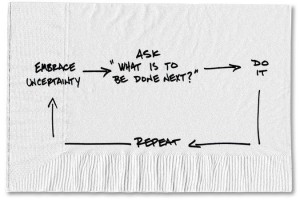First up for the 2015 Midlands Area Partnership Event is Louise Fisher, HR Director of Xerox Europe, talking about a professional approach to development.
Louise is going to talk about her career and she’s going to share what the CIPD is doing and has done to help everybody here with their careers.
Louise’s Career
Spent in retail management at the start. Louise learnt so much about business and making money – from high street fashion – leartn about speedy decision making. Next a business that had a valued brand that actually wnet on the balance sheet.
Sector most enjoyed in early career was hotel industry – thought retail was tough until worked there. 365 days a year. Lots of learning about scheduling and rostering. And great opportunities for holidays.
Having dne management training, Louise then moved into PErsonnal and stayed there ever since but specialised in L&D, Mgmt dvlpmt, Org dvlpmt. She took risks with her career choices – she went to different sectors, did different roles – you learn so much by getting out of the familiar.
She regrets never working abroad, learn a language and be immersed in a whole different culture.
Louise’s qualification was the IPM which had a lot of basis in psychology and human behaviour. Great knowledge to gain early and to help in her roles. Then in the 90’s she did a masters degree – another injection of knowledge and insight to apply back at work.
Louise is now the chair of the CIPD. In the 80’s and 90’s she sat on a branch committee that positively influenced her day job. Then she was appointed as a board member of the CIPD. For the first few months she behaved like an HR person when in fact what they needed was the focus on the governance of the charity. She was also on the audit committee for 6 years. All giving a completely different experience than she would ever have gained from a normal day job.
Benefits of volunteering with CIPD – shows flexibility, commitment, desire to learn, a breadth of experience and knowledge.
When at the start of her career Louise felt frustrated because she felt she had lots more she could do. and she did but she needed to become more mature, to take more time to stop and reflect. She did this in her 4th year in this role to consolidate – this frustrated her but it was the right thing. Gave her time to think broader than the day job.
Being a director was an huge eye opener being out of the day to day.
Louise believes every HR person should have a specialism in one of the HR disciplines. Stands you in good stead. Underpinning her’s was L&D and it enabled her to be more strategic, stepping away from the reactive day-to-day to think bigger, to research, to think, to gain time to make conscious choices and to work to a longer time frame than just ‘what’s happening today’.
Louise has spent time as the No2 to a couple of HR Directors and enjoyed it, had a lot of freedom, was responsible for lots of interesting projects. And always wondered if she could do a No1. She did her first HRD role in a printing role, as a 1200 employee business she was bored after 6 months. So she then started to work with each of the MDs within the business to help them think more strategically about their people.
She then went back into corporate – a very different environment to a small privately owned business – both helpful and demonstration of flexibility.
Plus, as before, Louise advocates getting voluntary experience – and for us to encourage that in those around us where we work. Her plan is to move into non-exec director roles as she gets towards the end of her ‘rat race’ working life.
Her advice – get out with managers, with sales people, with customers. Learn about their worlds, broaden your horizons. Louise recommends getting out of HR for a while to gain a completely different experience.
Tips on successful career management – (1) Prove you’re valuable, flexible, fun (2) Take some risks – risks that are a risk for you (we’re all different) (3) Get a voluntary job to develop outside of work (4) Get customer-facing experience and spend time in sales – learn the business inside out (5) Your career is YOUR responsibility and nobody elses! (6) Network – plagiarism is productivity and goodness knows we need to improve UK Productivity! Someone else here will be doing what you need to do and can hep you – and you can maybe help them or someone else #payitforward
CIPD Professions for the Future (PFF)
Louise has used the CIPD framework to inform her activity in Xerox –
- Insights on Changing Context – where’s your industry / market going, what does that mean for people?
- Science of Human and Organisational Behaviour – understanding this so we can motivate and engage more effectively
- HR and Learning Processes, Practices and Policies – how can technology help you to make processes simple and efficient so people aren’t spending time there. The ore global the org, the more essential this is
- Business, Commercial Insights and Analysis – know your business, get into the stuff the CIPD are doing and saying around HR analytics, how do you analyse data and WHAT WILL YOU USE IT FOR (my emphasis! – a pet hate about not doing data for data’s sake)
So why is PFF important?
CBW&WL (Championing Better Work and Working Lives) requires good HR and ppl dvlpmt > but good HR is context-specific > move from prescriptive best practice to broader principles > but it takes time to apply those principles in practice > so we need to build and maintain professionalism in HR > so HR remain trusted & credible.
The aims of CIPD membership – differentiated member proposition, promote HR as a conscious career choice, provide relevant support and to grow all levels of membership.
What’s been done in 2014/15 –
- Work
- Whistle blower advice line
- My CPD Map
- New networks
- Career support – Career hub
- Student bursaries – first come first served to new Level 3 foundation students and <£25k a year. Covers tuition and membership fees.
- Student recruitment activity
- Member research – migration, zero hours contracts, valuing your talent, CIPD Manifesto for Work, sustainable performance, neuroscience
- CIPD voice in the media (online press, radio, TV)
- +2.8% on membership
- +16.7% on student recruitment
- £900k investment in new activity
And the offer for fellows – focus on professionalism, more strategic content, work journal, fellow networks, opportunity to give back, mentoring, input into research, integrating a fellows policy group.
What the CIPD are doing to help you get value from your membership and help you get in and get on in the HR profession –
Needed to retain people after their study, give people reasons to go up through levels of membership, make HR a credible career for life.
CIPD are looking at the touchpoints where they can connect with people about joining HR.
They’re using website – plotr – like old fashioned careers advice but that’s actually helpful! Takes about half an hour but good fun and informative.
CIPD are going into schools and colleges to talk to students, they’re connecting with people in different places, they’re offering webinars for career advice, they’re running a mentoring scheme for people in HR, working with Penna to help people back into HR if been out for 6 months or more.
And more to come e.g. MOOCs, development in CPD area. Piloting 2 tools at the moment.
Final word – network, network, network! See #cipdmap15 for a pic of Louise’s top tips if you’re not sure where to start with this (11am 3/10).
This post has been live-blogged from #CIPDMAP15. I’ve done my best to represent the content accurately and fairly but some errors may exist. Most of it is the speakers’ content and I aim to show the bits that are my opinion.
Would you like to share this?


